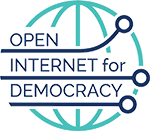
Credit: Access Now
Curbs on the internet offer a competitive advantage to authoritarian regimes vis-à-vis democracies, according to new research.
“If there is a benefit to imposing internet control, given the absence of effective international regulations, does this give authoritarian states an advantage in trade and national competitiveness?” MIT analyst Meicen Sun asks. “What might this mean for the future of democracy as the world grows increasingly dependent on digital technology?”
“The grim implication of my research is that without international regulation on information flow restrictions, democracies will be at a disadvantage against autocracies,” she tells MIT’s Leda Zimmerman. “No matter how short-term or narrow these curbs are, they confer concrete benefits on certain economic sectors.”
 Government-imposed internet shutdowns are on the rise globally, insulating those in power from democratic accountability, says a new analysis from Google’s Jigsaw project.
Government-imposed internet shutdowns are on the rise globally, insulating those in power from democratic accountability, says a new analysis from Google’s Jigsaw project.
But there is an economic downside to constraints on the internet, MIT’s Sun observes.
“They accord protectionist benefits to domestic data-internet-intensive sectors, on the one hand, but on the other, act as a potential longer-term deterrent to the country’s capacity to innovate.”
Sun’s research echoes the findings of recent reports from the National Endowment for Democracy’s International Forum which explores democratic responses to illiberal forces’ manipulation and projection of media and information-based influence.
The annual #FreedomOnTheNet report from Freedom House launches next week. Learn more about the project and follow here.
📲 📉 Our annual #FreedomOnTheNet report launches next week. Learn more about the project and follow @freedomonthenet for detailed updates. https://t.co/NvqLAjgmdN pic.twitter.com/V4CnNcMb2K
— Freedom House (@freedomhouse) September 13, 2021







